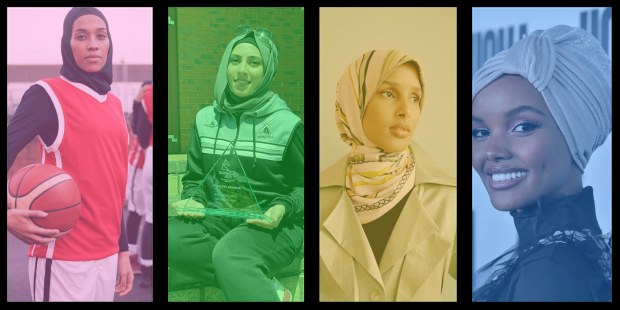These four Muslim women across the globe are resisting discrimination and reasserting their right to wear their Hijab.
Naila Khan | TwoCircles.net
NEW DELHI — The Karnataka High Court on March 15 pronounced its judgement on wearing hijabs in schools and classrooms. A three-judge bench ruled that wearing hijab by Muslim women does not fall under the essential practice of Islam. The controversy surrounding the Hijab started when some institutions in southern India denied hijab-wearing students access to the school, claiming it violates the institution’s dress code.
Muslim women have often been denied access to public spaces for wearing their headscarves. From not being hired for jobs to being trolled online for their choices, Muslim women have faced discrimination. This has led them to be victims of prejudice and right-wing hate. The hijab ban in Karnataka is about further invalidating and trivialising Indian Muslim women who choose to wear hijab. It hinders their right to participate equally in society.
TwoCircles.net features four Muslim women across the globe who are resisting discrimination and reasserting their right to wear their Hijab.
Asma Elbadawi, basketball player, spoken word artist and activist
In 2014, Asma Elbadawi (30) ran a two-year campaign to convince the International Basketball Federation (FIBA) to remove its ban on religious head coverings on courts. She began soliciting and gathering signatures on an online petition in 2017 and after she collected 130,000 signatures, FIBA reversed its rule and allowed players to wear headscarves on the field. Elbadawi is a role model to many young Muslim women around the world.
Elbadawi is a brand ambassador for Adidas and their latest ‘I’mPossible’ video campaign, Elbadawi states: “I don’t just play ball. I’m the queen of the ball. And I believe in equal play. When they tried to ban my hijab, I fought, I won, and kept wearing my crown. On my court, we all rise. My story is not impossible, because I’m possible.”
Halima Aden, Somali-American fashion model
In 2016, Halima Aden (24) was the first contestant to compete in her Miss USA state pageant wearing a hijab and burkini for the swimsuit competition. Aden is noted for being the first hijab-wearing supermodel. She was born in Kakuma, a refugee camp in Kenya, after her family fled the civil war in Somalia. She lived there for seven years with her parents before travelling to the United States and settling in Minnesota. According to Aden, Hijab is a choice and it is not forced upon her. In her interview with the Guardian, Aden says, “I want my sister, my little nieces, even my nephews to see representations of somebody who wears a hijab in modern ways, in such a way that they can relate to.”
Halima felt that to excel in the fashion industry she was being forced to compromise on her religious beliefs. This led her to quit the fashion industry in November 2020. She felt that she had lost control of her identity. “I got to a place where I couldn’t recognise my hijab the way I would traditionally wear it,” Aden told AFP in an interview.
Haseebah Abdullah, boxing coach
Haseebah Abdullah is the first boxing coach in England to wear a hijab and the first to challenge the rules on what is worn in the ring. Haseebah helped change official dress code rules to allow women to wear a headscarf & full-length clothing when training or competing. In an interview with Arab News, she said, “I hope I am a symbol of change and equality across sports. I hope that I am a good representation for young British-Pakistani women and women in general. Growing as a coach is what I wish to do, to provide the best guidance and support for the athletes I work with. I hope I can be a driving force in changing the attitudes and impressions people have of [boxing].” Haseebah has challenged stereotypes and aims to bring equality across the sporting industry.
Rawdah Mohamed, Somali-Norwegian model
Ever since the controversy around Hijab began in India, Muslim women took to social media to fight the hijab ban through hashtags like #HandsOffMyHijab #HijabIsOurRight etc. The infamous hashtag ‘Hands Off My Hijab’ was started by 27-year-old Rawdah Mohamed, a Somali-Norwegian model and activist who challenged France’s proposed hijab ban for minors. When Mohamed first moved to Norway, she was bullied for wearing a hijab at age 7.
In her 2019 interview with Vogue Magazine, she says, “I never really liked the idea of having to adjust the way I speak or the way I look just because it makes other people uncomfortable,” she says. “I just continued wearing it and it sort of became my shield and something I was proud of.”
Rawdah uses her voice on Instagram to share her experiences of discrimination and bullying for wearing the Hijab. In an Instagram post, Rawdah wrote, “I have lost count of the many times I was rejected for a job because of my hijab and not because of my lack of skill.” The hashtag has since been used by hundreds of Muslim women, including Congresswoman Ilhan Omar and Olympian Ibtihaj Muhammad.
In an interview with TIME, Mohamed states, “I don’t think politicians are the ones who are supposed to define what it means to be a Muslim woman.”
Naila Khan is an independent multimedia journalist pursuing master’s in Mass Communication at Jamia Millia Islamia, New Delhi. She tweets at @nailakhan05


